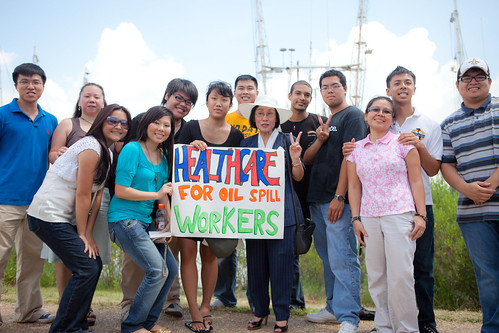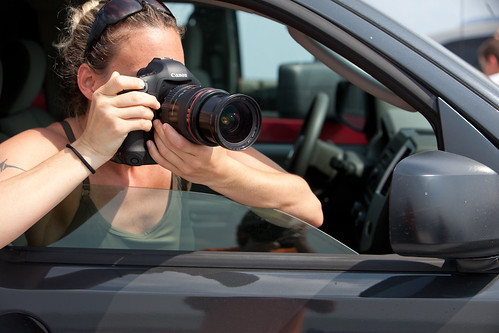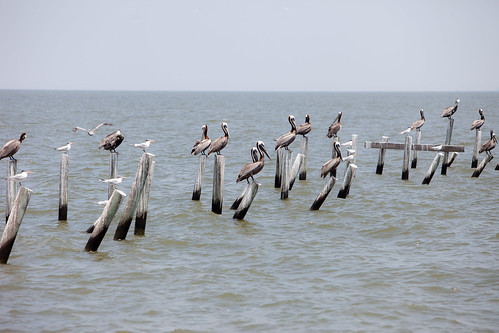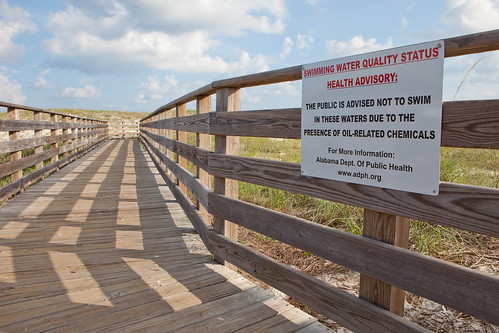Day 2: The heat fells beach cleaners, as oil permeates the surf but not sand
The TEDxOilSpill Expedition team started the day in the Gretna, LA IHOP and ate with the sense that we’d probably not be eating for a long time. Although the IHOP wait staff didn’t recognize it, we were also in a hurry and the urgency came from the need to boogie west out to Biloxi, Mississippi and attend a rally for Vietnamese shrimpers.
Not many Americans realize that the Greater New Orleans area, stretching from New Orleans to Biloxi, is home to the second largest concentration of Vietnamese in this country, behind the Bay Area. I remember as a graduate student at Tulane working among a huge community of Catholic Vietnamese immigrants in New Orleans east. They farmed the levees and held an enormous vegetable market on Sundays following 6AM mass. Women in conical bamboo hats squatted curbside and worked big plugs of betel nut between cheek and gum spitting a gooey red slime that stained their teeth and toes. The bargaining for cheap eggplant was only in Vietnamese, and was in that loud staccato that bounced through the narrow walls of the market.
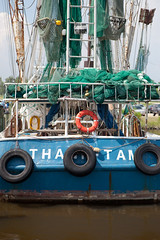 Different place, same feel at the rally. About 50% of these coastal Vietnamese families are shrimpers first and foremost and, like all the other shrimpers in the Gulf, this spill has completely and violently yanked their rugs from beneath them. Today in Biloxi, Mississippi they were demanding four things from their Mississippian Congressmen: language access, health care for oil spill workers, jobs and debt relief.
Different place, same feel at the rally. About 50% of these coastal Vietnamese families are shrimpers first and foremost and, like all the other shrimpers in the Gulf, this spill has completely and violently yanked their rugs from beneath them. Today in Biloxi, Mississippi they were demanding four things from their Mississippian Congressmen: language access, health care for oil spill workers, jobs and debt relief.
“Demand” might call to mind raucous screaming, bull horns, etc. – a la Kent State – but there was none of that. This was more like a well-organized, calm and collected ask from one unique Mississippian constituency to their representatives in Congress. Well mannered democracy. Thirty-five years separate these folks from what was a particularly tough situation in Southeast Asia. Now in their new home here in the southeastern US they’ve found themselves in another one.
By 11am the “rally” neatly and quietly packed up and the heat and humidity became unbearable so we made for the comfort of the rental car. I was worried about heat exhaustion. My four friends were worried about the condensation occurring in their cameras as we moved from hot and moist to cold and dry over and over again. I had until this trip thought of myself as fairly progressive and somewhat well versed in things technological. My four fun loving and incredibly techno-geeky friends made me feel like a cobbler from Pennsylvania Dutch country.
We worked well together as we made our way east toward Dauphin Island and Orange Beach, Alabama where our sources were saying the oil was coming ashore. I think I can speak for the group when I say that we were eager to see oil and birds caked in oil and the apocalyptic horror that I mentioned in some of my earlier blogs from this trip. I couldn’t help labeling these thoughts as somewhat perverse and exploitative. Were we somehow benefiting from the pain folks were feeling down here?
But in the end, while on the ferry from Dauphin Island to Fort Morgan, my mind landed on our work as mission driven, and that our mission was driving for good and for a better future for folks down here. It also landed on the fact that the apocalyptic horror out there was not geographically circumscribed to the Gulf, but was something we’re all responsible for. This isn’t just a Gulf issue.
After cooling off a bit in the shade and enjoying the company of a dozen or so guys and one woman from Lafayette, Louisiana who were working the beaches here in Alabama, we boarded the ferry and eventually found our way east to the Gulf Shores/Orange Beach area. Port Perdida Public Beach. Hundreds of workers were leaving the beaches by a caravan of busses.
“At least a handful of these guys keel over from the heat every day,” mentioned the EMT stationed at the worksite, “they ain’t from here and can’t deal with the heat. They ship ‘em in from Ohio and California. They work 15 minutes on, 15 minutes off and they still fall over.”
I wasn’t that far from falling over as we worked our way inconspicuously around the dunes and onto the beach. I was sure a small John Deer tractor would come and its driver would chase us off, but that didn’t happen. We arrived. No apocalyptic horror. For all their squeamishness in the heat, these guys could clean some sand. That said, the more you looked, the more you saw. The high-tide line was peppered with pea-sized tar balls. They’ve got the consistency of cat poo and smell when you squeeze them. And an orangey mess that had beaten the booms at their own game surfed the incoming waves. But, all and all, this beach seemed pretty clean to us.
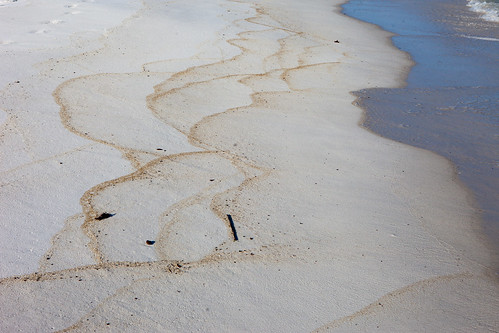
It makes perfect sense, of course. These beaches are the most accessible place in the entire Gulf. It’s easy to get labor here and easy to truck goop out. Oiled sand is fairly easy to clean compared with the salt and freshwater marshes further west in Louisiana. Antsy tourists cancelling reservations provide all the reason in the world to make these shores look ship shape. Louisiana seems to have a lot working against it.
***
Tomorrow we’ll wake before dawn and beat the workers to the beach at Port Perdida. We’ll see what 12 hours of wave action and a strong tide do to a recently cleaned beach. We’re looking forward to our little before-and-after experiment.
(Photography by Kris Krüg)
